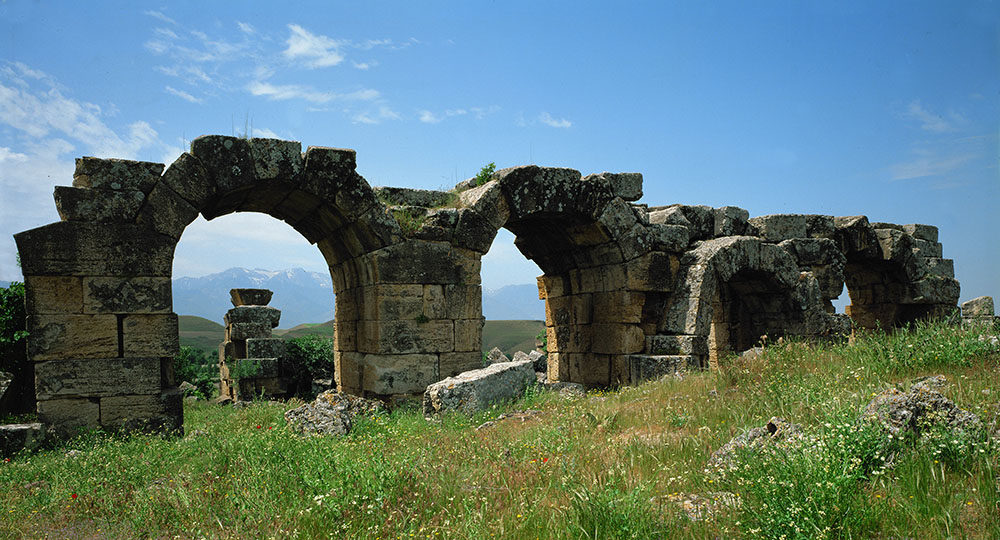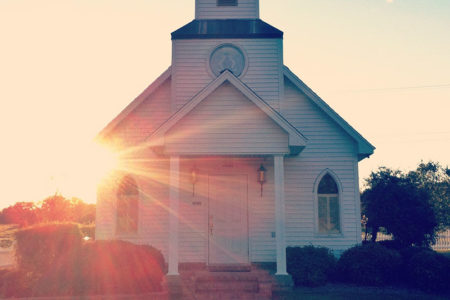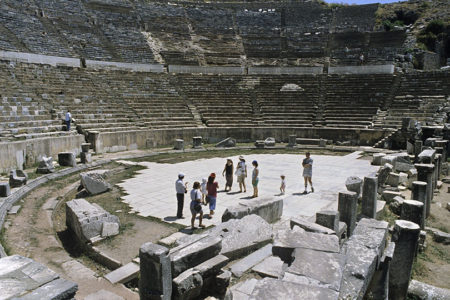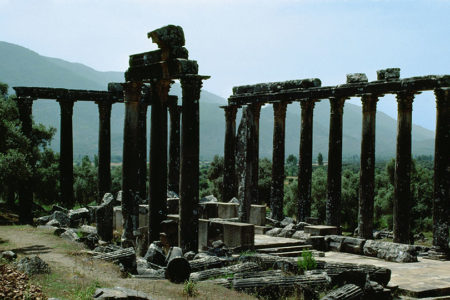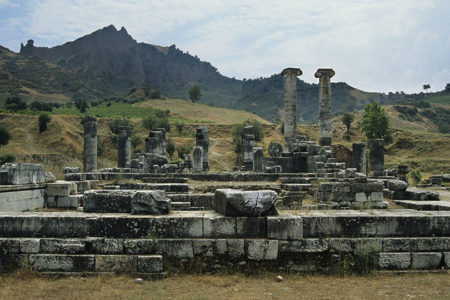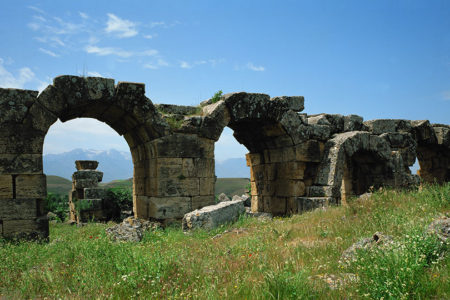Danger! Lukewarmness Ahead Revelation 3:14–22
And to the angel of the church of the Laodiceans write, “These things says the Amen, the Faithful and True Witness, the Beginning of the creation of God: ‘I know your works, that you are neither cold nor hot. I could wish you were cold or hot. So then, because you are lukewarm, and neither cold nor hot, I will vomit you out of My mouth. Because you say, “I am rich, have become wealthy, and have need of nothing”—and do not know that you are wretched, miserable, poor, blind, and naked—I counsel you to buy from Me gold refined in the fire, that you may be rich; and white garments, that you may be clothed, that the shame of your nakedness may not be revealed; and anoint your eyes with eye salve, that you may see. As many as I love, I rebuke and chasten. Therefore be zealous and repent’” (Rev. 3:14–19).
Lukewarmness. It’s nearly impossible to escape this menacing tendency. The 19th-century American evangelist G. D. Watson, in his book Soul Food, clearly stated its most pernicious factor:
One of the worst features about lukewarmness is that it steals on the soul in such quiet, respectable ways. If the horrible thing had horns and hoofs, and a smack of criminality in it, it would alarm the soul; but, as a rule, lukewarmness of spirit is so decent and well behaved, that it chloroforms its victim and kills him without a scream of terror. This is what makes it so awfully fatal. While open sin slays in hundreds, nice, respectable lukewarmness slays in tens of thousands!1
The spiritual state of the church at Laodicea was somewhere between boiling zeal and love gone cold (cf. Mt. 24:12; Rom. 12:11). This in-between spiritual condition nauseated the Lord. Laodicea’s complacency and God’s harsh rebuke of it warn us to avoid suffering the same awful fate. Of all the letters to the churches in the book of Revelation, this one is the most biting and sarcastic.
The City
Laodicea was located 40 miles east of Ephesus on the banks of the fertile Lycus River Valley in Asia Minor. It was colonized between 261 and 246 B.C. by the Seleucid king Antiochus II of Syria. He named the city after his wife, Laodice, whom he divorced and who later poisoned him.
By the first century A.D., Greeks and Greek-cultured Syrians and Romans inhabited Laodicea. A large Jewish population also faithfully sent a tribute of 20 pounds of gold regularly to Jerusalem. Some scholars suggested these Jewish people might have formed the main nucleus of the early Christian community. There is no indication the apostle Paul was ever in Laodicea. But Epaphras, a fellow worker, may have founded the church there (Col. 4:12–13).
Due to its strategic trade-route location, the city was a center for commercial activities. In the fertile ground of the valley, the Laodiceans bred a special sheep that produced fine, soft, glossy, black wool that was widely sought and admired. A renowned medical school was even established there. Its founder, Herophilos, believed that compound diseases required compound medicines. So the city doctors practiced a strange system of combining mixtures to create cures. Two moderately successful concoctions were an ear ointment made from spice nard and an eye salve made from Phrygian stones. The Phrygian stones were pulverized and the powder mixed with oil to produce the well-known eye balm. This compound, exported throughout the Greek and Roman world, brought welcome relief to many travelers who were exposed to the strong sun and wind as they traversed the harsh regions of the land. Naturally, with so much wealth and fame, a widespread banking industry thrived. Materially speaking, the Laodiceans felt comfortable in their prosperity.
The Charge (vv. 15–17)
However, the city had a major weakness. It had an overabundance of lukewarm water. Its northern neighbor, Hierapolis, six miles away, enjoyed the therapeutic effect of hot water from hot springs. Its eastern neighbor, Colossae, 10 miles away, had the refreshing power of cold water that was piped in beneath the scorching sun through an aqueduct several miles away. The now hot water would then spill over a mile-long cliff that dropped 300 feet down onto the level of Laodicea. By the time the water reached Laodicea it was tepid—neither hot nor cold. It was also filled with minerals picked up from the calcium carbonate that covered the cliff with a white encrustation. It was widely known that the city’s lukewarm, mineral-laden water was suitable only as a means to induce vomiting. In clear, strong, metaphorical language, the Lord used Laodicea’s worthless water supply to describe its spiritual uselessness; and it made Him sick (vv. 15–16).
The main issue Jesus had against this church was that it was lukewarm. The old, graphic expression to straddle the fence means to be neutral, undecided, or uncommitted. The Laodicean Christians were complacent and indifferent to Christ, which rendered them ineffective to heal the brokenhearted or refresh the weary.
Currently this straddling-the-fence form of devotion still churns God’s stomach. Imagine if Joshua, the great warrior leader, had been lukewarm about his commission to claim the Promised Land. He would not have said to Israel,
And if it seems evil to you to serve the Lᴏʀᴅ, choose for yourselves this day whom you will serve, whether the gods which your fathers served that were on the other side of the River, or the gods of the Amorites, in whose land you dwell. But as for me and my house, we will serve the Lᴏʀᴅ (Josh. 24:15).
Imagine if the great prophet Elijah had been lukewarm during his contention with the false priests of Baal. He would not have said to those who stood around, “‘How long will you falter between two opinions?If the Lᴏʀᴅ is God, follow Him; but if Baal, follow him’” (1 Ki. 18:21).
More important, Jesus Himself explained why straddling the fence does not work: “No one can serve two masters; for either he will hate the one and love the other, or else he will be loyal to the one and despise the other. You cannot serve God and mammon [i.e. riches, money, possessions, etc.]” (Mt. 6:24). Being lukewarm is unacceptable.
The Laodiceans thought they were secure in their affluence, but Jesus said they were actually poor. The word for “poor” in verse 17 is a Greek verb that actually means to “cringe as a beggar.” Their excessive trust in money, pleasure, and riches left them beggarly and impoverished before God. They were blind, self-deluded, wretched, and most miserable.
Scripture warns, “Command those who are rich in this present age not to be haughty, nor to trust in uncertain riches but in the living God, who gives us richly all things to enjoy” (1 Tim. 6:17).
The Challenge (vv. 18–22)
Jesus offered a threefold counsel to the congregation of Laodicea. First, it needed a pure faith to obtain true spiritual riches. The Lord used an old, familiar analogy: “gold refined in the fire” (v. 18).
Faith comes from the fire in the crucible of life’s trials (Job 23:10; 1 Pet. 1:7). The correlation is illustrated in the ancient smelting process. The gold ore was heated in a vessel until it melted. All the impurities were then scraped off the surface of the molten metal. The process was repeated over and over until all alloy elements were separated from the gold. Purity was assured when the goldsmith could see his reflection on the surface of the precious metal.
The Laodiceans were to reflect Jesus Christ in the trial of faith (1 Pet. 1:7). God’s warning to Israel long ago is the same warning for today: “I will turn My hand against you, and thoroughly purge away your dross, and take away all your alloy” (Isa. 1:25).
Second, Jesus told them to buy “white garments” to cover their nakedness (v. 18). White garments symbolize righteousness (19:8). The word nakedness is a metaphor for sin, judgment, and humiliation (Ezek. 16:37–39). God instructed them to repent of their sins and be clothed in His holiness. Scripture states, “Give unto the Lᴏʀᴅ the glory due to His name; worship the Lᴏʀᴅ in the beauty of holiness” (Ps. 29:2). “For God did not call us to uncleanness, but in holiness” (1 Th. 4:7).
Finally, Jesus told them to anoint their eyes with eye salve. “Eye salve” is the Greek word kollurioin, from the word kollura, meaning “a long roll of coarse bread.” As the Laodiceans mixed the grounded Phrygian powder with oil, a doughy, bread-like lump of paste was produced and applied to the eyes. The lukewarm believers were directed to have their eyes anointed. God’s remedy for spiritual blindness is the healing touch of Jesus the Messiah (Mt. 20:34). Today the eye salve is applied by focusing only on Jesus, who said, “I am the bread of life” (Jn. 6:48), and by reading, studying, memorizing, and meditating on the “bread” of God’s Word: “Your word is a lamp to my feet and a light to my path” (Ps. 119:105).
Jesus disdained the Laodiceans’ lack of usefulness and fruitfulness. Churches and individual believers must constantly guard against this alarming disposition. If devotion to Jesus Christ becomes a shallow, religious pastime rather than a passion of heart, mind, and soul, then beware. Jesus despises an ineffective church. God is no less concerned with complacency today than He was with that of the Israelites when He told them, “And it shall come to pass at that time that I will search Jerusalem with lamps, and punish the men who are settled in complacency, who say in their heart, ‘The Lᴏʀᴅ will not do good, nor will He do evil’” (Zeph. 1:12).
Therefore, be zealous, not for worldly pleasures, but for God (v. 19).
Beware, brethren, lest there be in any of you an evil heart of unbelief in departing from the living God; but exhort one another daily, while it is called “Today,” lest any of you be hardened through the deceitfulness of sin (Heb. 3:12–13).
Repentance is the key to a real relationship with the Lord. Jesus said, “Behold, I stand at the door and knock. If anyone hears My voice and opens the door, I will come in to him and dine with him, and he with Me” (v. 20). The word knock is present tense, indicating a continuous knocking. The challenge is for individuals to respond and open the door to Christ in their lives. The Lord said He will enter, and they will “dine” together, which speaks of fellowship, communion, and intimacy.
The great 19th-century American evangelist Dwight L. Moody once commented on this verse: “The latch of the door is on the inside. Who are my guests?”2 Either you open the door to the Lord or to lukewarmness. The choice is yours.
ENDNOTES
- D. Watson, Soul Food, Pilgrim’s Path <pilgrimspath.org/soul_5.html>.
- L. Moody, Notes From My Bible and Anecdotes & Illustrations, comp. Rev. J. B. McClure (1895; St. John, Ind.: The Christian Book Gallery, 1996), 188.
